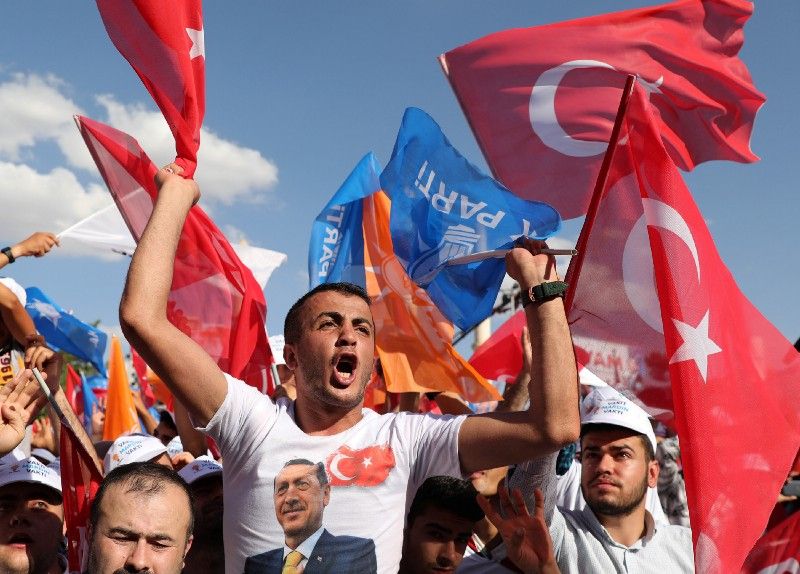June 22, 2018
Turkey faces a moment of truth.
On Sunday, presidential and parliamentary elections will pit President Recep Tayyip Erdogan and his Justice and Development Party (AKP) against multiple challengers. If no presidential candidate wins a majority, the top two finishers advance to a second-round vote on July 8.
This a deeply divided country that’s been governed under a state of emergency for nearly two years. Here’s your election cheat sheet:
Erdogan’s accomplishments: A generation ago, elites in the country’s largest cities — Istanbul, Ankara, and Izmir — dominated Turkey’s politics and economy, and the military acted as guardian of a strict secularism in public life. Erdogan, who first became prime minister in 2003, challenged the dominance of secularism and put religion at the center of public life. Critically, he also enacted policies designed to empower citizens and small businesses across Turkey’s conservative heartland.
GDP per capita nearly tripled during the first decade of Erdogan’s political rule.
The power grab: Erdogan, suspicious of military interference with his agenda, has fought for Putin-level power for years. Prevented by the rules of his party from continuing as prime minister, he won election as president in 2014 and pitched a referendum that would give the office of president much more power.
In July 2016, he responded to a failed military coup by imposing a state of emergency, still in effect today, that gave him extraordinary powers to tighten control of courts, police, and the army.
The crackdown: According to a March 2018 report from the UN High Commissioner for Human Rights, in 2017 the state of emergency allowed the government to…
- arrest nearly 160,000 people
- close 166 media outlets, including newspapers, magazines, publishing houses, TV and radio stations
- block 100,000 websites
- shut down 1,719 civil society organizations
Not surprisingly, 65 percent of Turks say they fear that “expressing political views online could cause trouble with authorities.”
Erdogan has said sinister deep-state forces, followers of former ally Fethullah Gulen, European leaders, the United States, and foreign credit agencies all want to undermine him and his country.
Election timing: Turkey’s decade of economic success turned sharply south after 2013. Double-digit inflation and a currency in turmoil are now top of mind for Turkey’s president and its people. This election wasn’t due until next year, but Erdogan, aware that a bad economy will probably get worse, decided to force this vote sooner rather than later.
The opposition: Erdogan may want Putin-like powers, but Turkey is not Russia. Opinions of Erdogan are split evenly across the country, and the political opposition is more united than at any time in many years. Muharrem Ince, candidate of the Republican People’s Party (CHP), has the best shot to beat Erdogan.
Given Erdogan’s thin-skinned reputation, it matters that Ince is smart, likable, outspoken, and has a sense of humor. He promises if elected to abolish a law making it a crime to insult the president and to convert the Erdogan-ordered $600 million presidential palace into a science center.
Crucially, the CHP has formed an alliance with the nationalist İYİ (Good) Party, which cuts into Erdogan’s popularity from the right, and an Islamist splinter party called Saadet.
The stakes: Erdogan narrowly won his April 2017 referendum, probably by cheating, but the new powers it grants to the office of the presidency — to issue decrees with the force of law and pack the courts with loyalists, for example — don’t take effect until after this election. There is growing concern that Erdogan will cheat again to win this weekend. He leads in the polls, but his margin is shrinking.
If opposition parties win control of parliament on Sunday and Erdogan must face a second round (on July 8), the next two weeks could become violent as the president turns up the rhetorical heat and rival protesters hit the streets.
The bottom line: This election will decide whether the man who has dominated politics in this important country for the past 15 years can extend his power indefinitely. There is a serious risk of confrontation and crisis in coming days.
More For You
- YouTube
At the 2026 World Economic Forum in Davos, GZERO’s Tony Maciulis spoke with Ariel Ekblaw, Founder of the Aurelia Institute, about how scaling up infrastructure in space could unlock transformative breakthroughs on Earth.
Most Popular
Haitian soldiers keep a watch outside the venue where businessman Laurent Saint-Cyr is set to be designated as president of Haiti's Transitional Presidential Council (CPT), in Port-au-Prince, Haiti, August 7, 2025.
REUTERS/Fildor Pq Egeder/File Photo
On Friday, US officials warned the transitional council in charge of Haiti not to remove interim Prime Minister Alix Didier Fils-Aimé, ahead of a deadline for the council to step down on Feb. 7.
Moldovan President Maia Sandu speaks during a Council of Europe diplomatic conference to launch the International Claims Commission for Ukraine, aimed at handling compensation claims related to Russia's war in Ukraine, in The Hague, Netherlands, December 16, 2025.
REUTERS/Piroschka van de Wouw
The president of the tiny eastern European country has suggested possibly merging with a neighbor.
Hard numbers: US pitches “New Gaza,” Japan paves way for snap elections, “Sinners” smashes records, & More
Jan 23, 2026
Middle East negotiator and son-in-law of President Trump, Jared Kushner talks with Israeli diplomats following a joint press conference in the State Dining Room of the White House in Washington, DC, USA, 29 September 2025.
$25 billion: The minimum amount of investment required to fulfil Jared Kushner’s ambitious property plan for Gaza.
© 2025 GZERO Media. All Rights Reserved | A Eurasia Group media company.
